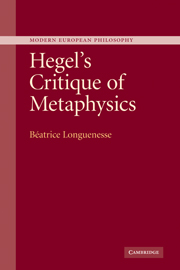Book contents
- Frontmatter
- Contents
- List of Abbreviations
- Note on Citations
- Preface
- PART I HEGEL'S CRITIQUE OF METAPHYSICS: A STUDY OF THE DOCTRINE OF ESSENCE
- Introduction
- 1 Transcendental logic and dialectical logic: from Kant to Hegel, a critique of all dogmatic metaphysics
- 2 Twists and turns of Hegel's contradiction
- 3 Ground against concept?
- 4 What is rational is actual, what is actual is rational
- Conclusion
- PART II POINT OF VIEW OF MAN OR KNOWLEDGE OF GOD
- Notes
- Bibliography
- Index
2 - Twists and turns of Hegel's contradiction
from PART I - HEGEL'S CRITIQUE OF METAPHYSICS: A STUDY OF THE DOCTRINE OF ESSENCE
- Frontmatter
- Contents
- List of Abbreviations
- Note on Citations
- Preface
- PART I HEGEL'S CRITIQUE OF METAPHYSICS: A STUDY OF THE DOCTRINE OF ESSENCE
- Introduction
- 1 Transcendental logic and dialectical logic: from Kant to Hegel, a critique of all dogmatic metaphysics
- 2 Twists and turns of Hegel's contradiction
- 3 Ground against concept?
- 4 What is rational is actual, what is actual is rational
- Conclusion
- PART II POINT OF VIEW OF MAN OR KNOWLEDGE OF GOD
- Notes
- Bibliography
- Index
Summary
Contradiction is ubiquitous in the Logic as well as in Hegel's system. Not just a contradiction, or some contradictions, determined in each case by the particular terms related to one another. Rather, what Hegel presents is contradiction as such, as a general figure of thought and therefore of being insofar as it is thought. Hegel offers what one might call a deduction of contradiction as an unavoidable moment of thought.
This deduction is given in the Doctrine of Essence. Not only is a chapter devoted to it (The Essentialities or Determinations of Reflection, which culminates with a section on contradiction: see GW 11, 258–291; S. 6, 35–80; L. 409–443), but one might maintain, as Mure did, that in a sense the whole Doctrine of Essence is an exposition of contradiction.
[T]o Hegel every category of Essence is a contradiction of inseparably coupled moments. In Essence Being and Nothing have at length emerged respectively as essential and unessential, but these two moments are now together in each phase of every triad: Essence is only Essence as the Essence of Being. “Die Wahrheit des Seins ist das Wesen.”
Contradiction is, at the heart of each object that is thought, the unity of essence and being. This unity is manifested, for a thought that is not sufficiently critical, as the unity of essence and seeming (Schein) which is nothing but “the seeming of essence within itself” (in sich selbst Scheinen).
- Type
- Chapter
- Information
- Hegel's Critique of Metaphysics , pp. 39 - 84Publisher: Cambridge University PressPrint publication year: 2007



